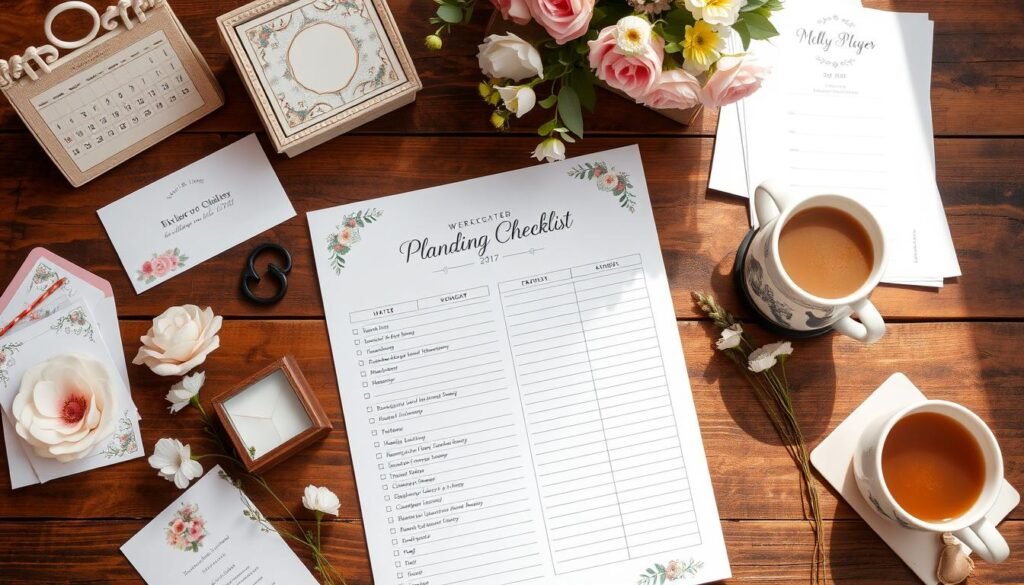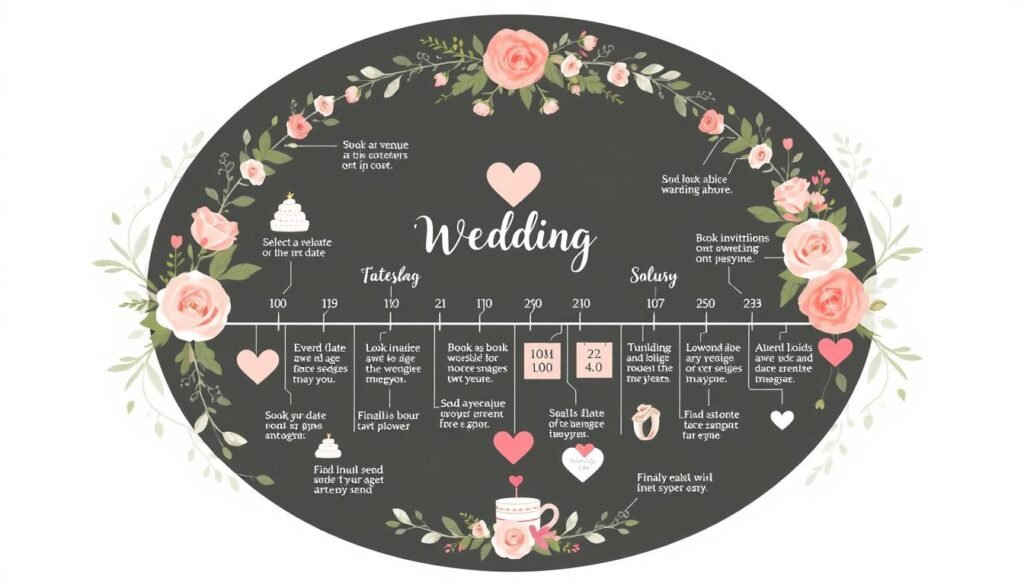Congratulations! 💍 You’re engaged, and your love story has taken an exciting new turn. Whether the proposal was a grand, orchestrated event or a private, intimate moment, this is a time to celebrate, soak in the joy, and dream about the future.
But let’s be real – once the champagne glasses are empty and the initial excitement fades, many couples find themselves asking, “What do we do now?” Planning a wedding can feel overwhelming, especially if you’re doing it yourself. Don’t worry – we’ve got your back. Think of us as your experienced, wedding-savvy friends who’re here to take you step by step through this exciting (and sometimes chaotic) process.
This guide will help you figure out what to focus on first, from celebrating your engagement to setting a date and budget, and everything in between. By the end, you’ll have a clear direction and feel ready to tackle wedding planning with confidence and excitement. Let’s dive in!
Pro Tip: Make sure you download your FREE Minimalist Wedding Planner. It will make your wedding planning so much easier.
Step 1: Celebrate Your Engagement
Before you start spreadsheets, checklists, and Pinterest boards, take a moment to truly celebrate! Being engaged is a once-in-a-lifetime experience, and it’s worth savoring before diving into the planning details.

Share the News
The first thing most couples want to do is share the big news with their loved ones. Announcing your engagement is a joyful milestone, and there are so many ways to make it special. Here are some ideas:
Tell Loved Ones First
Start with your closest family and friends before making a public announcement. This allows them to feel included in your special moment, and trust me, hearing their excitement makes it even more real.
- Parents: If possible, tell them in person or via video call. It’s a beautiful moment to share and might even bring a few (happy) tears.
- Siblings and Best Friends: A quick visit, call, or even a group chat will make them feel like they’re part of the inner circle of your celebration.
Plan an Engagement Party
If you love hosting, an engagement party is a wonderful way to celebrate with family and friends. It doesn’t have to be a big production – think a casual backyard get-together, a cozy dinner party, or cocktails at your favorite local bar.
Announce on Social Media
Ready to tell the world? Social media is your stage! Here are a few creative ways you can announce your engagement online:
- Photo Announcement: Share a picture of you and your fiancé with the ring front and center. Keep the caption simple, like “We’re engaged! 💍 Let the adventure begin.”
- Proposal Video: If your proposal was captured on video, share the moment with your followers. Add a heartfelt caption about how it felt.
- Themed Posts: Use props like mugs that say “Fiancé” or a letter board with the words “I said yes!” to add a playful touch.
Feeling shy about a public post? That’s okay, too. You can send out personalized engagement announcements via email or snail mail. If you want inspiration, we invite you to check the Creative Engagement Announcement Ideas we share later in this blog post, which can easily be adapted for engagement announcements!
Take Time to Enjoy the Moment
Wedding planning will soon take up a lot of your mental space, so give yourself permission to put the to-do list aside for a little while. Take a weekend getaway together, have a quiet dinner to celebrate, or simply spend time reminiscing about your proposal story. This is your time – enjoy it!
Step 2: Start Dreaming: Your Wedding Vision
Once you’ve celebrated, it’s time to start dreaming about what your wedding day will look like. Don’t worry about logistics just yet – this is purely about inspiration and excitement.
Create a Vision Board
A vision board is a fun way to gather ideas and start shaping your wedding style. Think of it as a creative brainstorming session:
- Pinterest Boards: Pinterest is the holy grail of wedding inspiration. Start saving images of everything you love – venues, color palettes, dresses, flowers, and more.
- Mood Boards: Use free tools like Canva to create a digital collage of your favorite elements. Include photos that represent the vibe you want, like romantic outdoor settings or chic city venues.
- Physical Boards: Print out photos or rip pages from magazines and pin them to a corkboard for a tangible, hands-on experience.
Think About Your Priorities
Ask yourselves some key questions:
- Do you want a big celebration or an intimate gathering?
- Do you have a dream venue or location in mind?
- What’s more important to you: amazing food, stunning decor, great music, or something else?
This is also a great time to read our How to Find the Ultimate Wedding Theme That Tells Your Love Story blog post, which will help you with narrowing down your ideas and creating a cohesive vision for your big day.
Step 3: Set a Wedding Budget
Let’s talk about the not-so-glamorous (but crucial) part of wedding planning: the budget. Your budget will guide every decision you make, so it’s important to set it early – and stick to it.
Where to Start
Sit down with your fiancé and any family members contributing financially to determine what you can afford. Be honest and realistic about your priorities.
Break It Down
A general budget breakdown might look like this:
- Venue and Catering: 40–50%
- Photography/Videography: 10–15%
- Flowers and Decor: 10%
- Attire: 5–10%
- Miscellaneous: 5%
For more detailed advice, head over to our Ultimate Guide for Building a Wedding Budget. It’s packed with tips on how to allocate your funds and avoid common pitfalls. And don’t be discouraged if your budget is tight – Get inspired with these 10 Budget-Friendly Wedding Tips and learn how to create a stunning celebration without overspending.
Step 4: Choose a Date
Picking your wedding date is a big decision, and it affects everything else on your planning timeline. Here’s how to choose wisely:
Consider the Season
Do you want a spring garden wedding, a cozy winter celebration, or a sunny summer bash? Think about the vibe you want, as well as practical factors like weather and guest availability.
Be Flexible
If you’re open to off-peak days (like Fridays, Sundays, or weekdays), you might score better deals on venues and vendors.
Once you have a date in mind, you can start building your wedding timeline. Check out our How to Create a Wedding Timeline blog post for a step-by-step guide to planning every detail.
“Savor every moment of your engagement – it’s a once-in-a-lifetime experience that you’ll want to remember forever.”
Step 5: Build Your Wedding Planning Checklist
Now that you’ve set a date and budget, it’s time to create a checklist to keep your planning organized. Here’s a general timeline:

12+ Months Before
- Create a preliminary guest list.
- Book your venue and key vendors (photographer, caterer, etc.).
- Choose your wedding party.
6–12 Months Before
- Decide on your wedding theme and decor.
- Order your dress and attire for the bridal party.
- Send out save-the-dates.
3–6 Months Before
- Plan your bachelorette party (see our Bachelorette Party Ideas for Every Bride for inspiration).
- Finalize your invitations and decor.
- Book honeymoon accommodations.
1–3 Months Before
- Confirm RSVPs and finalize seating arrangements.
- Create a day-of timeline for your vendors.
- Pack your wedding day emergency kit.
For a more detailed breakdown, head to our How to Create Your Dream Day Without a Planner blog post.
Step 6: Assemble Your Dream Team
Even the most organized, detail-oriented couples need a strong support system to pull off a successful wedding—especially if you’re handling most of the planning yourself. Think of your dream team as the people who will help bring your vision to life and make the process smoother and more enjoyable. This includes vendors, trusted friends or family, and your bridal party. Let’s break down each role and how they can help you:
1. Vendors: The Professionals Who Bring Your Vision to Life
Vendors are the backbone of your wedding day, providing the services and expertise you’ll need to turn your plans into reality. Since many popular vendors get booked months (sometimes over a year!) in advance, it’s crucial to start researching and securing your team early.
Key Vendors to Book First
Prioritize booking these vendors as soon as your wedding date and venue are set:
- Venue: Some venues come with in-house services like catering or decor, so you’ll need to confirm what’s included before hiring additional vendors.
- Photographer/Videographer: These pros will capture your memories, so invest in someone whose work resonates with you.
- Caterer: If your venue doesn’t include catering, research local options and schedule tastings to find the right fit.
- Entertainment: Whether it’s a DJ, live band, or string quartet, book early to secure your preferred entertainment.
Other Vendors to Consider
As you finalize your vision, you may also need:
- Florist: Discuss your color palette, theme, and favorite flowers to create stunning arrangements.
- Wedding Planner or Day-Of Coordinator: Even if you’re planning most of the wedding yourself, a day-of coordinator can ensure everything runs smoothly on the big day.
- Hair and Makeup Artists: Schedule a trial session to ensure you’re happy with the results.
- Cake Designer or Baker: Many couples choose to combine a tasting with their catering appointments.
How to Choose the Right Vendors
- Do Your Research: Read reviews, browse portfolios, and ask for recommendations from friends or family who’ve recently gotten married.
- Ask Questions: During consultations, ask about their experience, pricing, availability, and any specific policies (e.g., cancellation or overtime fees).
- Trust Your Instincts: Beyond their skills, you’ll be working closely with your vendors, so choose people you feel comfortable with and trust to execute your vision.
2. Friends and Family: Your Trusted Helpers
When you’re planning your wedding without a professional planner, your friends and family can be invaluable helpers. They’ll be there to offer support, advice, and hands-on assistance when needed. The key is to delegate tasks thoughtfully so you don’t feel like you’re doing it all alone.
How to Delegate Tasks Effectively
- Play to Their Strengths: Assign tasks based on what each person is good at. For example, if your cousin is a crafting whiz, ask them to help with DIY decor. If your best friend is detail-oriented, they might be great at managing RSVPs or creating a seating chart.
- Be Specific: Instead of saying, “Can you help with the wedding?” provide clear instructions like, “Can you research three local florists and send me a list of their prices and portfolios by next week?”
- Set Boundaries: While it’s great to accept help, remember that this is your wedding. Politely decline advice or assistance that doesn’t align with your vision.
Tasks Friends and Family Can Help With
- DIY Projects: From assembling centerpieces to creating welcome bags, these tasks are more fun (and faster) with a small group.
- Vendor Research: Ask a trusted friend to gather quotes or set up initial consultations.
- Wedding Day Logistics: Assign someone to manage last-minute details, like confirming vendor arrival times or directing guests to their seats.
A Word of Caution
While it’s wonderful to have loved ones involved, be mindful of overburdening them (or yourself). If certain tasks feel too stressful or time-consuming, consider outsourcing to a professional.
3. Your Bridal Party: The Ultimate Cheerleaders
Your bridal party isn’t just there to stand beside you at the altar—they’re your emotional support system and hands-on helpers throughout the planning process. Choose your bridesmaids, groomsmen, or wedding party members thoughtfully, focusing on people who genuinely care about you and your happiness.

How to Choose Your Bridal Party
- Focus on Relationships: Choose people who have been a consistent, positive presence in your life.
- Consider Commitment Levels: Being in a bridal party requires time, energy, and financial investment (e.g., buying attire, attending events). Select individuals who are willing and able to commit.
- Don’t Feel Pressured: You’re not obligated to include someone just because they’re family or because you were in their wedding party.
What Your Bridal Party Can Help With
Your bridal party can take on a variety of roles to help ease your planning stress. Here are a few examples:
- Moral Support: Whether you need someone to vent to or help you make tough decisions, your bridal party is there to listen and encourage you.
- Pre-Wedding Tasks: They can assist with dress shopping, planning the bachelorette party, or helping with DIY projects.
- Wedding Day Support: On the big day, they’ll help with everything from getting ready to keeping you calm. Assign roles like holding your bouquet, managing the train of your dress, or corralling guests for photos.
How to Show Your Appreciation
Your bridal party is giving their time and energy to support you, so make sure they feel valued:
- Personalized Gifts: Consider thoughtful gifts like custom robes, engraved jewelry, or personalized tumblers. Our Personalized Wedding Favors Guests Will Love blog post has great ideas that could double as bridal party gifts.
- Thank-You Notes: A heartfelt, handwritten note goes a long way in expressing your gratitude.
- Keep Them in the Loop: Regularly update your bridal party on plans and give them plenty of notice for events like dress fittings or the rehearsal dinner.
4. Don’t Forget Your Fiancé!
It’s easy to get caught up in the whirlwind of planning and forget that this is a partnership. Your fiancé is your number-one teammate, so involve them in the process. Divide tasks based on your strengths and interests—for example, if you love decor but they’re a foodie, you can handle flowers while they focus on choosing the caterer.
Planning together strengthens your bond and ensures the wedding reflects both of you as a couple. Plus, it’s a great way to share the responsibilities and keep things from becoming overwhelming.
Creative Engagement Announcement Ideas
Announcing your engagement is one of the most exciting first steps after saying “Yes!” It’s your chance to share the joy and excitement with loved ones, whether in-person, online, or through a creative gesture that reflects your personality as a couple. Here are some unique engagement announcement ideas to inspire you:
1. The Classic Couple Photo
Sometimes, simplicity is best. Share a beautiful photo of you and your fiancé to let everyone know about your engagement.
- Pose Ideas:
- A close-up of your hands with the ring in focus.
- A candid shot of the two of you laughing or embracing.
- A recreation of the proposal moment.
- Caption Ideas:
- “Forever starts now. 💍”
- “We’re engaged! Let the wedding planning begin!”
- “He asked, and I said YES!”
This is perfect for couples who love timeless, elegant announcements. Pair it with a location that’s meaningful to you, like where the proposal happened or your favorite date spot.
2. Creative Social Media Posts
Social media is the go-to platform for sharing big news. Here are some creative ideas to stand out:
- Ring Selfie with a Twist:
Take a selfie showing off the ring, but add a playful caption like:
- “Does this ring make me look engaged?”
- “New accessory, who dis?”
- Countdown Graphic:
Post a graphic with text like, “We’re engaged! Wedding countdown begins…” paired with your wedding date or a fun message like “365 days to ‘I Do!’”
- Proposal Video:
If the proposal was recorded, share a short, edited version with a caption about how magical the moment was.
3. Incorporate Your Pets
If you have pets, why not include them in your announcement? Pets are family, after all!
- Photo Ideas:
- Put a sign around your dog’s neck that says, “My humans are getting married!”
- Have your cat sit next to a sign that says, “She said yes!”
- Pose your pet with the ring box (bonus points if they’re wearing a cute bow tie or flower crown).
This adds a playful and adorable touch, especially if your furry friend holds a special place in your relationship.
4. Creative Props
Use props to make your announcement extra unique and visually fun:
- Letter Boards or Signs: Write a fun or heartfelt message, like:
- “Pop the champagne, we’re engaged!”
- “Finally putting a ring on it.”
- Coffee Mugs: Hold mugs that say “Future Mr.” and “Future Mrs.” or “Fiancé” and “Fiancée.”
- Balloon Backdrop: Create a photo backdrop with balloons spelling out “LOVE” or “Engaged.”
5. Themed Announcements
If you and your fiancé share a love for something specific—like movies, sports, or a hobby—use that as inspiration for your engagement announcement.
- Movie Poster Theme: Create a graphic that looks like a romantic comedy movie poster, starring the two of you with the title: “She Said Yes!”
- Sports Theme: Pose with jerseys that display your wedding date as the numbers, or hold a sign that says, “Team [Last Name] is getting married!”
6. Include Your Favorite Place
Highlight a meaningful location in your announcement:
- Proposal Location: If the proposal happened somewhere special, take a photo there and caption it with, “The spot where forever started.”
- Travel Lovers: If you’re a couple who loves to travel, use a globe or map with a caption like, “Next stop: Forever.”
7. Personalized Video or Reel
Create a short video or Instagram Reel to tell the story of your relationship and proposal. This can be as simple or elaborate as you like:
- Use clips of your favorite moments together, ending with the proposal.
- Add your favorite song or a romantic soundtrack.
- Include text overlays like, “From dating to forever… we’re engaged!”
8. Holiday-Themed Announcements
If you got engaged around a holiday, tie the announcement into the season:
- Christmas: Share a photo in front of your Christmas tree with the caption, “All I want for Christmas is… forever with you.”
- New Year’s Eve: Post a photo of the ring with champagne flutes and the caption, “Starting the new year with a fiancé!”
- Valentine’s Day: Announce with a heart-themed photo and say, “The best Valentine’s gift ever: a fiancé!”
9. Engagement Announcement Cards
If you prefer a more personal touch, send out engagement announcement cards through mail or email.
- Photo Cards: Include a professional or casual photo of the two of you with a message like, “We’re thrilled to announce our engagement!”
- Story Cards: Share the story of your proposal and include a fun trivia section like, “Where he popped the question” and “Our wedding date (coming soon!)”
This is especially thoughtful for family and friends who might not be active on social media.
10. Fun and Playful Ideas
If you’re a couple who loves humor, make your engagement announcement lighthearted and fun:
- Board Games or Cards: Hold up a Scrabble board spelling “Engaged” or a deck of cards with the words “We’re winning at love!”
- Food-Inspired: Incorporate your favorite meal with captions like, “Pizza my heart forever. We’re engaged!” or “He popped the question… now pass the champagne!”
- Meme Culture: Create a meme-style post using a funny photo of you two with text like, “When he puts a ring on it, and now you’re planning a wedding!”
11. Use Nature as a Backdrop
Take your announcement outdoors to create a scenic, romantic moment:
- Pose in a field, forest, or beach with a sign that says, “We’re engaged!”
- Write your engagement announcement in the sand or snow, then capture a photo with the two of you standing next to it.
12. Share the Proposal Story
Sometimes, the best engagement announcements are heartfelt and personal. Share the story of how your fiancé proposed:
- Write a social media post or blog that takes your audience through the moment step-by-step.
- Include what you were feeling, how they popped the question, and any funny or sweet details.
Pair this with photos or videos from the day to create an announcement that feels truly personal and unique.
Lastly, remember that your engagement announcement is all about sharing your joy in a way that feels authentic to you. Whether you keep it simple with a classic photo or go bold with a creative, themed shoot, the most important thing is that it reflects your personality as a couple. This is just the beginning of your wedding journey—so take the time to celebrate this special milestone before diving into the planning!

Final Thoughts
Planning your wedding doesn’t have to feel overwhelming. By taking it one step at a time, you’ll turn what might feel like an endless to-do list into an exciting journey toward your dream day.
Celebrate your engagement, dream big, and build a strong foundation with your budget and timeline. Remember, this is about creating a day that reflects you and your love story. Take breaks when you need them, lean on your support system, and enjoy every moment—because this is your time to shine.
For more wedding planning tips and inspiration, explore the rest of our blog. You’ve got this! 💕




